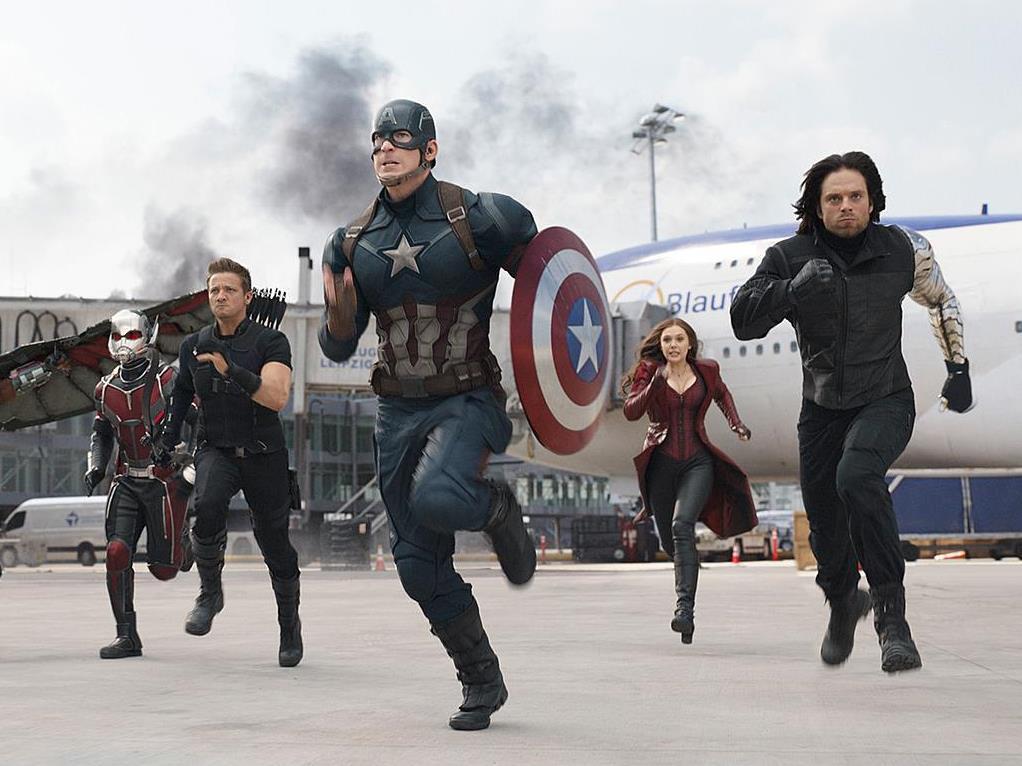Image: Captain America: Civil War; photograph courtesy of Disney.
Since 2008, audiences have watched Tony Stark (Robert Downey Jr., The Judge) leverage his technical savvy and financial security to become the robotic suit-wearing Iron Man, then band together with similarly enhanced individuals and endeavour to save the world multiple times. Since 2011, they’ve also witnessed Steve Rogers (Chris Evans, Snowpiercer) transform from weak and sickly to a military might, before becoming a source of old-fashioned thinking in the ongoing war against global threats after being frozen in time. Each now boasts three standalone films, two prominent roles in The Avengers features, and an assortment of other appearances within the broader Marvel Cinematic Universe. Across their lengthy screen history, their traits, personalities and perspectives have become established: one is a fast- and smart-talking ball of brashness and bravado, while the other proves reserved and considerate in contrast.
Gracing the screen again in Captain America: Civil War — and clearly poised for an altercation, as the film’s subtitle makes plain — it’s the duo’s dissimilarities that define them in their current outing. The movie may champion a lone figure in its name, yet at its core sits a battle between seeming opposites; if the 12 preceding features to date have achieved one thing other than continually building a world for ensuing efforts to feed into, it’s fleshing out its key protagonists. Knowing who Stark and Rogers are, and their Iron Man and Captain America alter egos, too, is a given for viewers that have consumed each cinema instalment over the past nine years. Consistency in performers may give the franchise an edge over its counterparts in that regards; however slowly but surely, the Marvel masterminds have made these characters, their strengths and flaws, and their complicated histories feel lived in.
That’s why, when the two leads face off over the repercussions of both their efforts in 2015’s The Avengers: Age of Ultron and their last combined mission, arguing over their responsibility to avoid civilian fatalities and the possibility of the United Nations overseeing their crime-fighting activities, their conflict isn’t just an excuse for an a host of special effects-laden combat or a way to set up the films that will follow. Captain America: Civil War does each of those things as it tracks the ripple that splits the Avengers camp, sparked by Stark and Rogers’ adversarial for and against stances regarding potential government supervision, and heightened by the latter’s fondness for his old pal Bucky ‘Winter Soldier’ Barnes (Sebastian Stan, The Martian) after a subsequent international incident. More than that, though, it grounds its story in all that has come before, instead of just throwing a few physical and verbal frays together while looking towards what comes next.
It’s a mature move by sibling directors Anthony and Joe Russo and writers Christopher Markus and Stephen McFeely, all four of whom return from 2014’s Captain America: The Winter Soldier (and will helm and script the forthcoming Avengers: Infinity War – Part 1 in 2018 and Avengers: Infinity War – Part 2 in 2019 as well). While clearly rewarding avid fans over casual consumers, when the film pits two of its leaders against each other, the emotional investment that the series has earned over its duration deepens every duel, lingers in every line, and gives the visual wizardry genuine stakes.
Comparisons with the most recent superhero battle to reach screens, Batman V Superman: Dawn of Justice, are unsurprisingly hard to escape given the themes and fights on display, and the roster of supporting talent — this time including Black Widow (Scarlett Johansson, The Jungle Book) and Scarlett Witch (Elizabeth Olsen, I Saw the Light), as well as thoughtfully introducing Black Panther (Chadwick Boseman, Gods of Egypt) and the fresh incarnation of Spider-Man (Tom Holland, In the Heart of the Sea) — also thrown into the mix. Here, however, exploring why these characters do what they do, showing the consequences and dissecting the reality of an ideological divide remains substantial and satisfying, as well as entertaining.
The end result may be a little elongated, hews closely to the expected template, and offers up a slightly more serious tone than previous outings, yet it engages as the latest Marvel chapter and as the culmination of all that has lead to this point. Avoiding conflating solemnity with grimness, the film’s careful sense of gravity proves one of its chief strengths, and not just because of the range it adds to Downey Jr.’s and Evans’ understated, sympathetic performances, nor the way that it suits franchise newcomer Daniel Brühl’s (Woman in Gold) mysterious role. Never merely quipping about or pouting at the narrative’s goings-on but appreciating the scale and sentiment of the central feud adds to the emotional journey; jokes still land, and light-heartedness still lifts sequences such as the web-slinger’s first appearance and the brief involvement of scene-stealer Ant-Man (Paul Rudd, TV’s Wet Hot American Summer: First Day of Camp), but the feature thrillingly balances heaviness, heart, and humour. Similarly, the finely choreographed action benefits in the same regard, seeming restrained and spatially daring as it flings people at each other rather than tears cities apart — and yet, proving more powerful.
An epic clash or several may be at the centre of Captain America: Civil War, but in its story as much as its spectacle, so is the personal and interpersonal plight of well-known superheroes struggling with their differences.
Rating: 3.5 stars out of 5
Captain America: Civil War
Directors: Anthony Russo and Joe Russo
USA, 2016, 147 mins
Release date: April 28
Distributor: Disney
Rated: M
Actors:
Director:
Format:
Country:
Release:





